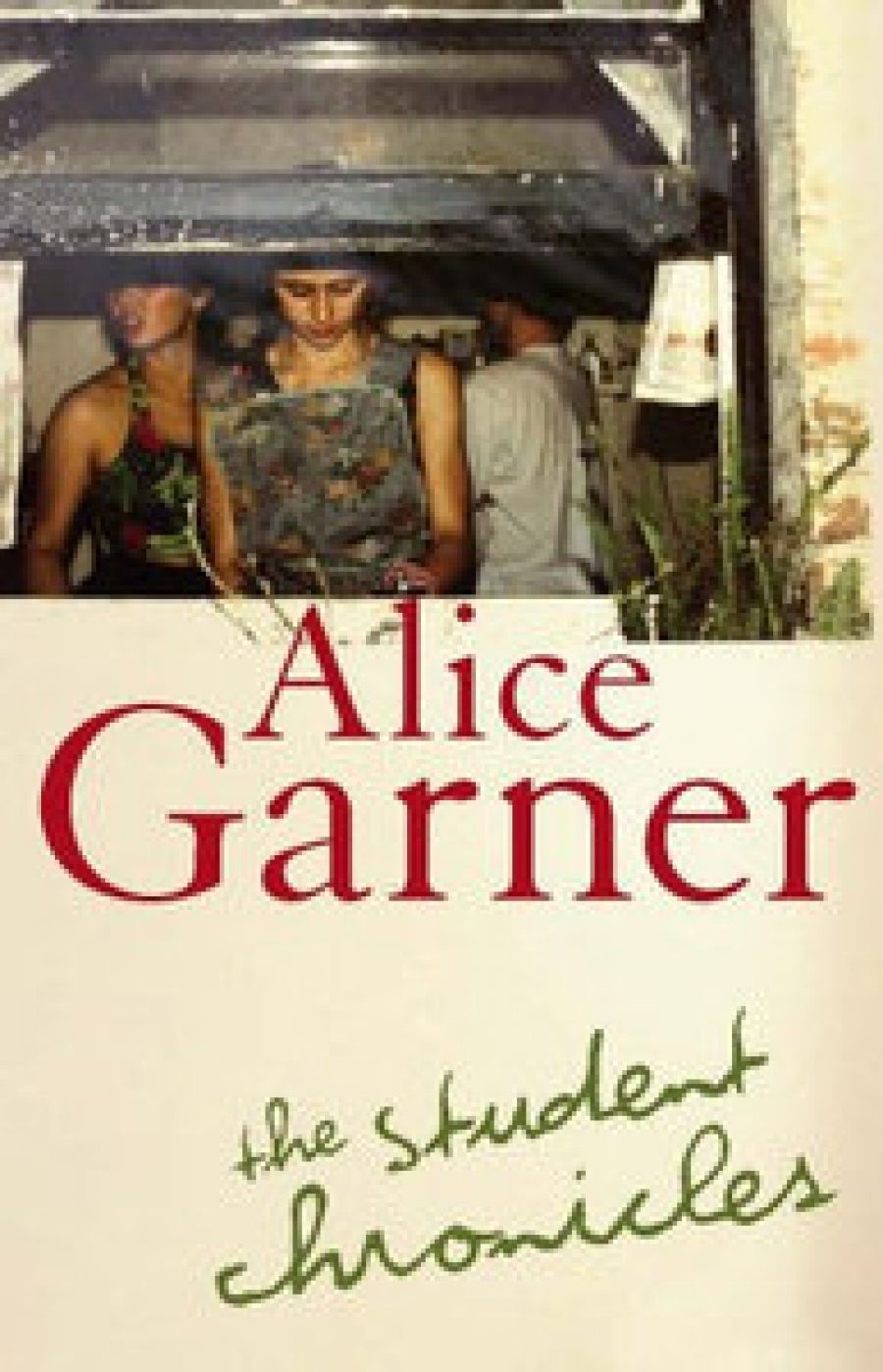
- Free Article: No
- Contents Category: Memoir
- Review Article: Yes
- Online Only: No
- Custom Highlight Text:
Despite its rather grandiose title, Alice Garner’s The Student Chronicles is a friendly, unpretentious book. It is a coming-of-age story, set mostly in libraries – an anti-Monkey Grip, or a love letter to geekdom. The only sex happens behind closed doors; the real romance is with the library. ‘I loved the Baillieu Library so much I wrote a really bad poem about it,’ Garner confesses, with characteristic self-deprecation. Occasionally, she takes her reader by the hand – like a less precious Alain de Botton – and guides them towards the classics. Thus she introduces Montaigne, a partial model for this book, as a writer of ‘disarming modesty and honesty’, two qualities that the author herself possesses.
- Book 1 Title: The Student Chronicles
- Book 1 Biblio: Miegunyah, $24.95 hb, 167 pp
- Book 1 Readings Link: booktopia.kh4ffx.net/Qo12z
The italicised ‘think’ is typical of Garner’s style: despite her large credentials, she refuses to be drawn into the grand statement. Instead, over the course of the book, she discovers a taste for the particular, for history’s ‘little eddies, the colour of the stones through the water, the insects buzzing on the surface’. Surrealism bothers her, unsurprisingly: she is a literalist, and seeks comfort in facts. And after much time sifting through other people’s facts, she turns to her own:
I began to see that there were treasures to be found in the streets and people who lived around me, in Melbourne, and to realise that I might eventually attach the same kind of weight to my own family and community history that my French acquaintances attached to theirs.
Garner brings a warm authorial voice to this alternative history, and it is a voice that is not entirely unfamiliar. I hesitate to invite the family along to the party, but Helen Garner has really been invited already. She is a frequent presence in the book, stroking the writer’s face with a folded-up piece of paper and sending her emphatic, capitalised missives (reassuring her, for instance, that encyclopedias and libraries can be ‘EROTIC’). And despite their very different material, the voices of these two women resonate. This is not necessarily the work of influence: the two of them might just think similarly and talk similarly, as relatives are apt to do. Like her mother, Alice Garner has an appealing, conversational style. She is deft at the pencil sketch and at the disarming self-revelation. Helen Garner’s plain-speaking intelligence can read like affectation in the hands of its imitators, but Alice’s similar voice feels both earned and lived in.
Garner’s narrative ease, however, is not always enough to rescue her from her own diligence as an historian. She describes herself as an ‘archivist-hoarder’; in its slacker moments, the book reads too much as an archivist’s hoard. ‘Ah, the allocation of rooms. That was a tough one,’ she writes, and devotes more than a page to an explication of room allocation in her share house. None of this is far enough removed in time to be quaint, or to afford that shuddering recognition, ‘they were just like us’. Of course they were just like us: they were living across the road, just a decade ago. Similarly, there is too much self-quotation. I understand the historian’s attraction to the primary source, but there are numerous lines, such as ‘I should buy a packet of those Tip-ex things’, that scarcely warrant inclusion in a letter in the first place, let alone resurrection in a book sixteen years later. Garner recognises this in herself: ‘The hard part at uni was rising above the mess of detail, of “facts” and competing interpretations of them, to arrive at some kind of conclusion, an over-arching statement about it all; this is something I still struggle with.’
The real struggle in this book might in fact be with the subject matter. Garner has had a fascinating life – child-hood households of early dirty realism, prepubescent hitch-hiking around Australia, parties on Al Pacino’s yacht – but she has chosen not to write about any of this. Instead, she addresses herself to the relatively uneventful years she spent in libraries. As rich as these years must have been for her, where is the story? Study is one of those things that does not translate well into anecdote; you really have to be there.
It is a foolish reviewer who faults a book for not being a different book entirely, but I do hope Garner will write a different book next. I would like that warm and searching voice to turn to other things: her work with refugees, perhaps, or her experience as an actor. Or to that ‘chaotic’ childhood – even if that particular terrain has been worked over already by someone so very close to home.


Comments powered by CComment